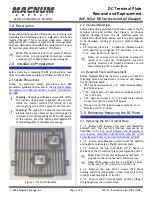
© 2006 Magnum Energy, Inc.
Page 2 of 2
Service Instructions: 64-1002 (7/06)
3.2 Replacing the DC Terminal Plate
The steps below assume the DC terminal plate has been
damaged and is being replaced by a “new” DC terminal
plate. If replacing the same DC terminal plate, ignore
the reference to the “new” DC terminal plate.
3.2.1
Slide the new DC terminal plate down the front
wall of the inverter base; make sure the slots on the side
of the new DC terminal plate are aligned correctly (see
figure 4, item A).
Note:
The DC terminal plate has a slight V-shape
(the top is slightly wider than the bottom) and
can only be correctly installed one way.
3.2.2
Firmly push down on the new DC terminal plate
until it sits flush against the base of the inverter.
3.2.3
Screw in the two #10-32 screws (T25 head) that
hold the front of the new DC terminal plate to the
inverter base (see figure 4, item B).
3.2.4
Connect the new DC terminal plate to the DC
buss-bars/buss-wires using the two ¼-20 bolts (7/16”
head). Refer to figure 2 or 3, depending on the inverter’s
FET board. Torque these connections to 130 in. lbs.
Caution
: Ensure these ¼-20 bolts are reconnected
in the same way as they were removed and are
correctly torqued. These connections are required
to carry very high DC current and an improper
connection will affect the performance of the
inverter and may cause damage.
3.2.5
The DC terminal plate is now installed; review all
the connections a final time to ensure they are correct.
Figure 2, DC Terminal Plate to Small FET Board
Figure 3, DC Terminal Plate to Large FET Board
Figure 4, Front-of the DC Terminal Plate
3.2.6
If you have no other internal repairs to
perform, reinstall the top cover as described in the
Top
Cover Removal and Replacement with Internal Component
Identification (ME, MS or RD Series Inverter/Charger),
Service Instructions: 64-1001.




















